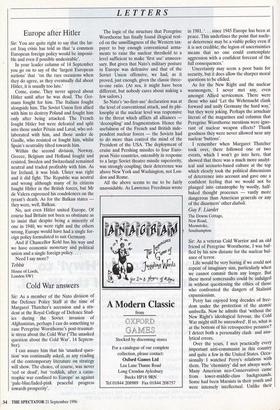Cold War answers
Sir: As a member of the Nato division of the Defence Policy Staff at the time of Margaret Thatcher's accession and a stu- dent at the Royal College of Defence Stud- ies during the Soviet invasion of Afghanistan, perhaps I can do something to ease Peregrine Worsthorne's post-traumat- ic stress about the Cold War (`The unasked question about the Cold War', 14 Septem- ber).
I can assure him that his 'unasked ques- tion' was continually asked, as any reading of the contemporary literature on strategy will show. The choice, of course, was never `red or dead', but 'reddish, after a catas- trophic war confined to Europe' as against 'pale-blue/faded-pink peaceful progress towards prosperity'. The logic of the structure that Peregrine Worsthorne has finally found illogical rest- ed on the unwillingness of the Western tax- payer to buy enough conventional arma- ments to raise the nuclear threshold to a level sufficient to make 'first use' unneces- sary. But given that Nato's military posture in Europe was defensive and that of the Soviet Union offensive, we had, as it proved, just enough, given the classic three- to-one ratio. (At sea, it might have been different, but nobody cares about nuking a few sailors.) So Nato's 'no-first-use' declaration was at the level of conventional attack, and its phi- losophy at the nuclear level was responsive to the threat which afflicts all alliances — `decoupling' and fragmentation. Hence the usefulness of the French and British inde- pendent nuclear forces — the Soviets had to do more than control the mind of the President of the USA. The deployment of cruise and Pershing missiles to four Euro- pean Nato countries, ostensibly in response to a large Soviet theatre missile superiority, was strongly coupling; their deterrence was above New York and Washington, not Lon- don and Rome.
All the above seems to me to be fairly unavoidable. As Lawrence Freedman wrote in 1981, .. since 1945 Europe has been at peace. This underlines the point that nucle- ar deterrence may be a viable policy even if it is not credible; the legion of uncertainties means that no one could contemplate aggression with a confident forecast of the full consequences.'
Uncertainty may seem a poor basis for security, but it does allow the sharper moral questions to be elided.
As for the New Right and the nuclear warmongers, I never met any, even amongst Allied servicemen. There were those who said 'Let the Wehrmacht clank forward and unify Germany the hard way,' but they were joking. Perhaps the armchair literati of the magazines and columns that Peregrine Worsthorne mentions were igno- rant of nuclear weapon effects? Thank goodness they were never allowed near any nuclear 'buttons'.
I remember when Margaret Thatcher took over, there followed one or two events, which I won't go into here, that showed that there was a much more analyt- ical and scenario-based culture at the top which clearly took the political dimensions of deterrence into account and gave one a confident feeling that we would not be plunged into catastrophe by woolly, half- baked thought processes — vastly more dangerous than American generals or any of the disarmers' other diaboli.
Guy F. Liardet
The Downs Cottage, New Road, Meonstoke, Southampton


















































































 Previous page
Previous page